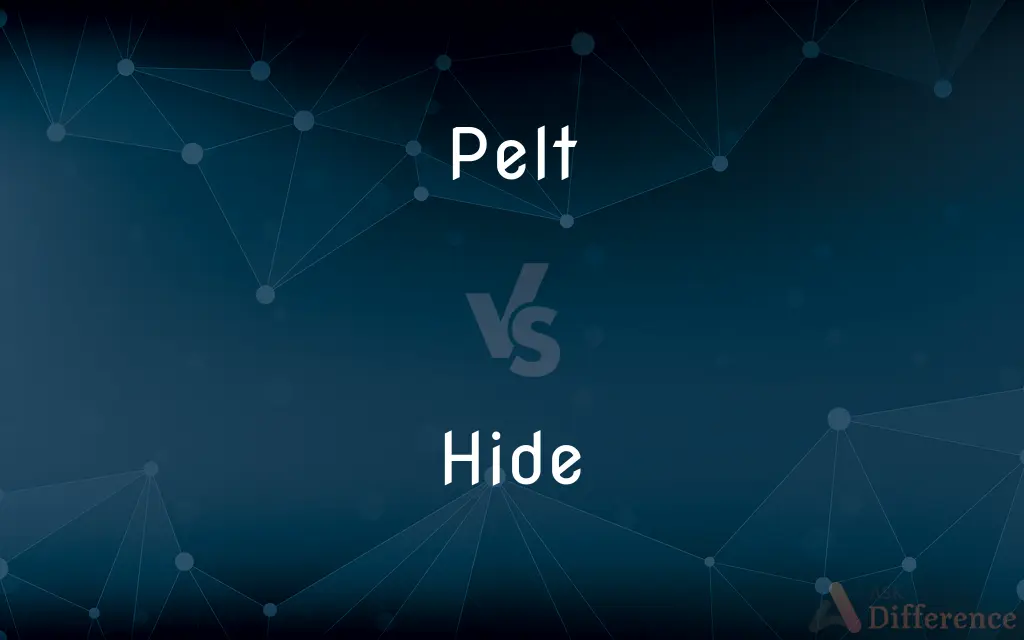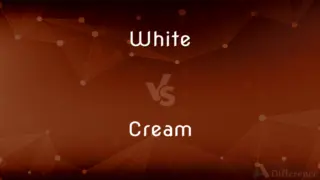Pelt vs. Hide — What's the Difference?
By Urooj Arif & Fiza Rafique — Updated on March 8, 2024
Pelt refers to the skin of an animal with fur or hair still attached, often used in the context of hunting or fur trading, while hide is the skin of an animal, especially larger ones, used for leather after being treated.

Difference Between Pelt and Hide
Table of Contents
ADVERTISEMENT
Key Differences
Pelt is the term commonly used when referring to the skin of animals that have fur or hair, which is usually removed from the animal and can be used for making clothing, accessories, or other items. On the other hand, hide is specifically the skin of larger animals, such as cows or deer, which, after undergoing a tanning process, is turned into leather, a durable and versatile material used in a wide variety of applications.
While pelt emphasizes the presence of fur or hair that is often valued for its warmth and aesthetic appeal, hide focuses on the potential of the skin to be transformed into leather, highlighting its strength and durability. This distinction is crucial in industries like fashion, where the type of animal skin used determines the texture, appearance, and utility of the final product.
The term pelt also carries connotations related to the fur trade, a sector that deals with the buying and selling of animal fur. Hide, however, is more closely associated with the leather industry, which encompasses a broader range of applications, including furniture, footwear, and automotive interiors.
In terms of processing, pelts usually undergo processes aimed at preserving the fur or hair, such as cleaning, drying, and sometimes dyeing. Conversely, hides are subjected to tanning, a chemical process that stabilizes the proteins in the skin, making it resistant to decomposition and suitable for creating leather goods.
Environmental and ethical considerations also play a role in the use of pelts and hides. The pelt industry often faces scrutiny for animal welfare concerns, while the leather industry, despite similar concerns, also deals with environmental issues related to the tanning process, which can be highly polluting.
ADVERTISEMENT
Comparison Chart
Definition
Skin of an animal with fur or hair
Skin of a larger animal used for leather
Primary Use
Clothing, accessories
Leather goods (e.g., shoes, bags)
Material Source
Smaller animals (e.g., rabbits, foxes)
Larger animals (e.g., cows, deer)
Industry
Fur trade
Leather industry
Processing
Cleaning, drying, dyeing to preserve fur
Tanning to transform into leather
Compare with Definitions
Pelt
Involves preservation of fur.
After hunting, the pelt was carefully processed to maintain its quality.
Hide
Foundation for the leather goods market.
High-quality hides are essential for producing premium leather products.
Pelt
Associated with animal rights issues.
Activists protest the use of animal pelts in the fashion industry.
Hide
Includes tanning to become durable leather.
The hide undergoes several tanning stages to ensure its longevity.
Pelt
The skin of a furry animal.
The hunter sold the pelt of the fox for a good price.
Hide
Focuses on the impact of tanning chemicals.
Environmentalists are concerned about the pollution from leather tanning.
Pelt
Used in the fur industry.
The fashion designer chose a luxurious pelt for the new winter collection.
Hide
The skin of a large animal prepared for leather.
The tannery received a shipment of cow hides to be made into leather.
Pelt
Often prized for its aesthetic.
The softness and color of the pelt make it highly valuable.
Hide
Valued for strength and durability.
The durability of the hide makes it ideal for making tough leather jackets.
Pelt
The skin of an animal with the fur or hair still on it.
Hide
To put or keep out of sight or away from notice
Hid the money in a sock.
Pelt
A stripped animal skin ready for tanning.
Hide
To prevent the disclosure or recognition of; conceal
Tried to hide the facts.
Pelt
To strike or assail repeatedly with thrown objects
Pelted each other with snowballs. ].
Hide
To cut off from sight; cover up
Clouds hid the stars.
Pelt
The skin of an animal with the hair or wool on; either a raw or undressed hide, or a skin preserved with the hair or wool on it (sometimes worn as a garment with minimal modification).
Hide
To avert (one's gaze), especially in shame or grief.
Pelt
The skin of an animal (especially a goat or sheep) with the hair or wool removed, often in preparation for tanning.
Hide
To keep oneself out of sight or notice.
Pelt
The fur or hair of a living animal.
Hide
To seek refuge or respite
"no place to hide from boredom or anger or loneliness" (Matt Teague).
Pelt
Human skin, especially when bare; also, a person's hair.
Hide
To beat severely; flog.
Pelt
(obsolete)
Hide
The skin of an animal, especially the thick tough skin or pelt of a large animal.
Pelt
A garment made from animal skins.
Hide
An old English measure of land, usually the amount held adequate for one free family and its dependents.
Pelt
(falconry) The body of any quarry killed by a hawk; also, a dead bird given to a hawk for food.
Hide
(transitive) To put (something) in a place where it will be harder to discover or out of sight.
He hides his magazines under the bed.
The politicians were accused of keeping information hidden from the public.
Pelt
A beating or falling down of hailstones, rain, or snow in a shower.
Hide
(intransitive) To put oneself in a place where one will be harder to find or out of sight.
Pelt
A blow or stroke from something thrown.
Hide
To beat with a whip made from hide.
Pelt
A verbal insult; a jeer, a jibe, a taunt.
Hide
(countable) The skin of an animal.
Pelt
A fit of anger; an outburst, a rage.
Hide
The human skin.
Pelt
An act of moving quickly; a rush.
Hide
One's own life or personal safety, especially when in peril.
To save his own hide
Better watch his hide
Pelt
A tattered or worthless piece of clothing; a rag.
Hide
(countable) mainly British A covered structure from which hunters, birdwatchers, etc can observe animals without scaring them.
Pelt
(by extension) Anything in a ragged and worthless state; rubbish, trash.
Hide
A secret room for hiding oneself or valuables; a hideaway.
Pelt
Alternative form of pelta
Hide
(countable) A covered structure to which a pet animal can retreat, as is recommended for snakes.
Pelt
(historical) A small shield, especially one of an approximately elliptical form, or crescent-shaped.
Hide
(historical) A unit of land and tax assessment of varying size, originally as intended to support one household with dependents.
Pelt
(botany) A flat apothecium with no rim.
Hide
To conceal, or withdraw from sight; to put out of view; to secrete.
A city that is set on an hill can not be hid.
If circumstances lead me, I will findWhere truth is hid.
Pelt
To remove the skin from (an animal); to skin.
Hide
To withhold from knowledge; to keep secret; to refrain from avowing or confessing.
Heaven from all creatures hides the book of fate.
Pelt
Chiefly followed by from: to remove (the skin) from an animal.
Hide
To remove from danger; to shelter.
In the time of trouble he shall hide me in his pavilion.
Pelt
To remove feathers from (a bird).
Hide
To lie concealed; to keep one's self out of view; to be withdrawn from sight or observation.
Bred to disguise, in public 'tis you hide.
Pelt
(transitive)
Hide
To flog; to whip.
Pelt
To bombard (someone or something) with missiles.
The children are pelting each other with snowballs.
They pelted the attacking army with bullets.
Hide
An abode or dwelling.
Pelt
To force (someone or something) to move using blows or the throwing of missiles.
Hide
The skin of an animal, either raw or dressed; - generally applied to the undressed skins of the larger domestic animals, as oxen, horses, etc.
Pelt
Of a number of small objects (such as raindrops), or the sun's rays: to beat down or fall on (someone or something) in a shower.
Hide
The human skin; - so called in contempt.
O tiger's heart, wrapped in a woman's hide!
Pelt
Chiefly followed by at: to (continuously) throw (missiles) at.
The children pelted apples at us.
Hide
The dressed skin of an animal (especially a large animal)
Pelt
To repeatedly beat or hit (someone or something).
Hide
Body covering of a living animal
Pelt
(figuratively) To assail (someone) with harsh words in speech or writing; to abuse, to insult.
Hide
Prevent from being seen or discovered;
Muslim women hide their faces
Hide the money
Pelt
(intransitive)
Hide
Be or go into hiding; keep out of sight, as for protection and safety;
Probably his horse would be close to where he was hiding
She is hiding out in a cabin in Montana
Pelt
Especially of hailstones, rain, or snow: to beat down or fall forcefully or heavily; to rain down.
It’s pelting down out there!
Hide
Cover as if with a shroud;
The origins of this civilization are shrouded in mystery
Pelt
(figuratively) To move rapidly, especially in or on a conveyance.
The boy pelted down the hill on his toboggan.
Hide
Make undecipherable or imperceptible by obscuring or concealing;
A hidden message
A veiled threat
Pelt
Chiefly followed by at: to bombard someone or something with missiles continuously.
Pelt
(obsolete) To throw out harsh words; to show anger.
Pelt
To bargain for a better deal; to haggle.
Pelt
The skin of a beast with the hair on; a raw or undressed hide; a skin preserved with the hairy or woolly covering on it. See 4th Fell.
Raw pelts clapped about them for their clothes.
Pelt
The human skin.
Pelt
The body of any quarry killed by the hawk.
Pelt
A blow or stroke from something thrown.
Pelt
To strike with something thrown or driven; to assail with pellets or missiles, as, to pelt with stones; pelted with hail.
The chidden billows seem to pelt the clouds.
Pelt
To throw; to use as a missile.
My Phillis me with pelted apples plies.
Pelt
To throw missiles.
Pelt
To throw out words.
Another smothered seems to pelt and swear.
Pelt
The dressed hairy coat of a mammal
Pelt
Body covering of a living animal
Pelt
Cast, hurl, or throw repeatedly with some missile;
They pelted each other with snowballs
Pelt
Attack and bombard with or as if with missiles;
Pelt the speaker with questions
Pelt
Rain heavily;
Put on your rain coat-- it's pouring outside!
Common Curiosities
What is a hide?
A hide is the skin of a large animal that, after being treated, is used to make leather products.
How are hides processed?
Hides are processed through tanning, a chemical procedure that transforms them into durable leather.
Why is pelt considered valuable?
Pelt is considered valuable for its aesthetic appeal and warmth.
What is a pelt?
A pelt is the skin of a furry animal, often used for making clothing or accessories.
What industries use pelts?
The fur industry predominantly uses pelts for fashion and accessory products.
How are pelts processed?
Pelts are processed by cleaning, drying, and sometimes dyeing to preserve the fur.
What are the environmental impacts of using hides?
The leather industry faces environmental challenges, especially from the pollution caused by tanning chemicals.
How does the leather industry mitigate environmental damage?
The industry is exploring more sustainable tanning methods and materials to reduce its environmental impact.
Are pelts and hides sourced from the same animals?
No, pelts are usually sourced from smaller, furry animals, whereas hides come from larger animals.
Can pelts be turned into leather?
Yes, but the term "pelt" typically emphasizes the fur aspect, while "hide" refers to skins processed into leather.
What makes hide valuable?
Hide is valued for its strength and durability, making it ideal for leather goods.
What industries use hides?
The leather industry uses hides to create a variety of goods, including furniture, footwear, and automotive interiors.
Can synthetic alternatives replace pelts and hides?
Synthetic alternatives are available and are becoming more popular due to ethical and environmental concerns.
What are the environmental concerns associated with pelts?
The main concerns include animal welfare issues and the ethical implications of fur trading.
Is the use of pelts ethically contested?
Yes, the use of pelts is often contested due to concerns over animal rights and welfare.
Share Your Discovery

Previous Comparison
White vs. Cream
Next Comparison
Beanie vs. CapAuthor Spotlight
Written by
Urooj ArifUrooj is a skilled content writer at Ask Difference, known for her exceptional ability to simplify complex topics into engaging and informative content. With a passion for research and a flair for clear, concise writing, she consistently delivers articles that resonate with our diverse audience.
Co-written by
Fiza RafiqueFiza Rafique is a skilled content writer at AskDifference.com, where she meticulously refines and enhances written pieces. Drawing from her vast editorial expertise, Fiza ensures clarity, accuracy, and precision in every article. Passionate about language, she continually seeks to elevate the quality of content for readers worldwide.














































